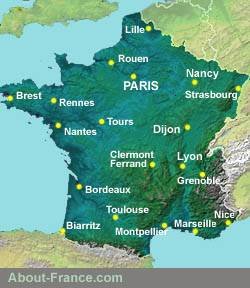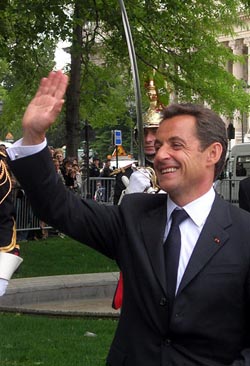 |
||||


President Sarkozy - Photo R Jouan - CC
| ►► Site guide |
| About-France.com home |
| Full site index |
| About-France.com site search |
| ►► Principal chapters on About-France.com : |
| Guide
to the
regions of France Beyond
Paris, a guide to the French regions and their tourist attractions.
|
| Guide
to Paris Make
the most of your trip to Paris; Information on attractions, Paris
hotels, transport, and lots more.
|
| Tourism in France
The
main tourist attractions and places to visit in France - historic
monuments, art galleries, seasides, and more
|
| Planning
a trip to France
Information
on things to do before starting your trip to France.
|
| Driving
in France
Tips
and useful information on driving in and through France - motorways,
tolls, where to stay....
|
| Maps
of France
Cities,
towns, departments, regions, climate, wine areas and other themes.
|
| The
French way of
life
A mine of information about
life and living in France, including
working in France, living in France, food and eating, education,
shopping.
|
| A-Z
dictionary of France Encyclopedic
dictionary of modern France - key figures, institutions, acronyms,
culture, icons, etc.
|
Changes to the Constitution in 2008
On 21st July 2008, the French "Congress" - an exceptional joint sitting of the two chambers of the French Parliament, the Chambre des D�put�s and the S�nat - approved the most fundamental changes to the French Constitution since it was first set up in 1958.
The result of the vote was a cliffhanger to the end, with many Deputies from the ruling UMP party unwilling to predict whether the proposal would achieve the required three-fifths majority of votes required. In the end, the Congress accepted the proposal by 539 votes to 357, one vote more than the 538 required.
On opposition benches, anger was immediately vented against the one member of the Socialist Party who voted in favour of the changes. Defying the official party line, former Socialist minister Jack Lang publicly announced that he would vote in favour of the changes - claiming that most of the proposed changes had been Socialist policy for many years. Had he voted against the reform, the proposals would not have gone through.
The modifications essentially changed the relations of power between the President and Parliament.
The President: Until 2008, the French president was barred from adressing parliament, under the principle of the separation of executive and legislative power. From now on, the President can address a joint session of the French Congress once a year, a right similar to that given to Presidents of the United States through the annual State of the Union address. Similarly, as in the USA, a French president can now only be elected for two terms of office - though these are five-year terms.
(The length of the presidential term in office was previously reduced from seven years to five, by President Chirac; the situation is thus now a long way from the unlimited seven-year terms that were enshrined in the original constitution of the Fifth Republic. President Mitterrand served two full seven-year terms.)
The Parliament also gets strengthened powers.
From now on, a parliamentary commission can veto presidential appointments, notably appointments to the Constitutional Council (Conseil constitutionnel), to the Senior Council of Magistrates (Conseil sup�rieur de la magistrature) , and the new ombudsman.
There are also considerable restrictions on the use of the much-maligned "Article 49.3" of the Constitution. This is the clause in the French constitution that allows legislation to be pushed through by the government without parliamentary approval. This article can now only be applied in the case of financial bills, bills dealing with the financing of the health service, and one other bill per parliamentary session.
French citizens living overseas will from now on be represented in the National Assembly by their own Deputies.
Military action:
Until now, as Supreme head of the Armed Forces, the French President was able to declare war without consulting Parliament.. From now on, the President must inform parliament of any troop deployment overseas, and Parliament must approve any military deployment lasting over four months.
Civil liberties, citizens' rights.
Finally, the Constitutional changes introduce new civil liberties. Individuals can now appeal to the Constitutional Council if they believe that they are victim of a law that runs counter to the basic civil liberties guaranteed by the French Constitution.
For other issues, the changes establish an official ombudsman, a "defender of citizens' rights".
The changes also introduce the notion of "Popular referendum" into French political life. From now on, a referendum can be organised if the request is made by at least 10% of French electors, with the support of at least 20% of MPs.
More information: see
Ads
from Google
Copyright notice:
Website
and text � About-France.com 2003 - 2019 except where
otherwise
indicated.
Reproduction authorised on educational websites subject to conditions
Reproduction authorised on educational websites subject to conditions
